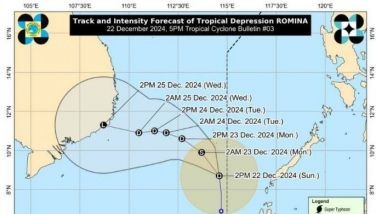No such thing as ‘forever’

Albay Congressman Joey Salceda, who is the recognized resident economist at the 17th Congress, authored and helped shepherd the passage into law of the five-step package of comprehensive tax reforms program. The first of which was signed into law last year by President Rodrigo Duterte now called as the controversial Tax Reform Acceleration and Inclusion (TRAIN) Law.
A prolific lawmaker, Salceda is the vice chairman of four House committees, namely, on ways and means; on economic affairs; on appropriations; and on local governments. Last week, Salceda was named chairman of the House committee on climate change in the aftermath of House leadership change in Congress that saw the assumption of former president and now Pampanga Congresswoman Gloria Macapagal-Arroyo as new Speaker.
Christened no less by Salceda himself, the TRAIN law took effect on Jan. 1 this year. Being the first to be approved, it is now called as TRAIN-1 that reduced personal income tax but it also imposed higher oil and coal tax, higher sugar tax, and expanded value added tax (VAT) coverage.
But the uncertainties and expectations of even higher prices have triggered many sectors to adjust the prices of their goods and services upward the past months. Thus, average inflation rate rose to 4.0% in January 2018, or higher from the 3.3% full year average of 2017. The actual pass-through effect of TRAIN 1 started being fully felt by March this year.
Just a month ago when he was guest in our Kapihan sa Manila Bay, Salceda already projected the country’s inflation rate would shoot up beyond 6% unless the government does something drastic to bring down the prices of rice, fish, meat and poultry products through reduction of tariff and removal of non-tariff barriers to import them.
It was during our Kapihan sa Manila Bay last Aug. 8 when Salceda presented to media his proposed package of measures as the designated focal person of Speaker GMA’s economic team. This included the signing by President Duterte of an Executive Order (EO) to reduce tariff on these imported food products while the 17th Congress went on recess last month.
These measures, along with the importation of 500,000 to 800,000 tons of rice, are projected to slow down inflation to 4.9 percent by the end of the year by calculations done by Salceda. These proposed economic and fiscal measures were endorsed to the economic managers of President Duterte. Upon advice of his economic team, however, President Duterte did not issue any EO.
Yesterday, President Duterte indicated a change of mind with his “free-for-all” importation policy as immediate measure to bring down inflation rate from 6.4% last month.
Before holding his 29th Cabinet meeting, President Duterte announced this as the 17th Congress is set to go on another recess starting Oct. 13 until Nov. 11.
In a televised “tete-a-tete” with chief presidential legal counsel Salvador Panelo at Malacanang yesterday, the Chief Executive shut down proposals to suspend TRAIN-1 as a solution to stave off further rise of inflation.
Meanwhile, the Lower House already approved on third and final reading TRAIN-2, or the second package of tax reforms meant to “modernize” fiscal incentives and reduce the corporate income tax rate. The second package of the Duterte tax reforms program was dubbed as Tax Reform for Attracting Better and High-Quality Opportunities, or TRABAHO bill.
Obviously, the bill was so renamed appropriately with a more acceptable sounding title, TRABAHO. It is actually one of the many Spanish words assimilated in our native tongue which means jobs. In broad strokes, Salceda described the proposed TRABAHO bill as a package of many features geared enhancement of fiscal incentives in favor of medium, small and micro-enterprises (MSMEs).
Salceda’s TRABAHO bill seeks to gradually remove these tax perks and fiscal incentives from so-called “infant” or “pioneering” industries under which they were classified as registered at the Philippine Economic Zone Authority (PEZA) and at the Board of Investments (BOI).
As PEZA and BOI-registered enterprises, they put up factories and manufacturing operations here in our country that entitled them open-ended tax holidays and other fiscal incentives, especially for those engaged in pioneering industries. Facetiously, Salceda calls these enterprises as “geriatric” already. He likened them to old but healthy and wealthy patients still connected to intravenous tubes, thriving on tax holidays and other government fiscal incentives.
The bill retains current incentives for two years to give investors enough time to adjust to the new tax reforms and apply for new incentives appropriate to their business that would be listed in the TRABAHO bill.
The House-approved version seeks to gradually lower corporate income tax rates to 20 percent from 30 percent, or by two percent annually starting 2021. The bill carried the Department of Finance (DOF) proposal to rationalize and consolidate fiscal incentives under a single omnibus incentive code by reduction of the various tax exemptions and tax holidays. The DOF study shows a reduction by two percent annually could result in revenue loss of around P62 billion in 2021.
With the TRABAHO bill, Salceda pointed out more than 900 of these “infant” companies that are perpetually enjoying these tax perks up to now will be out-ed if they fail the performance tests of their contributions to the Philippine economy.
“There is no such thing as forever, especially tax holidays,” Rep.Salceda declared.
This is in reference to the perpetual tax holidays PEZA and BOI enterprises enjoy while the greater majority of MSMEs pay correct amount of taxes to the government.
* * *
Rep. Salceda will discuss the newly approved House TRABAHO bill along with Finance assistant secretary Antonio Lambino and ALU-TUCP vice president Louie Corral and Ed Cutiongco of the Petroleum Association of the Philippines as reactors in today’s Kapihan sa Manila Bay at Cafe Adriatico in Remedios Circle, Malate.
- Latest
- Trending




























